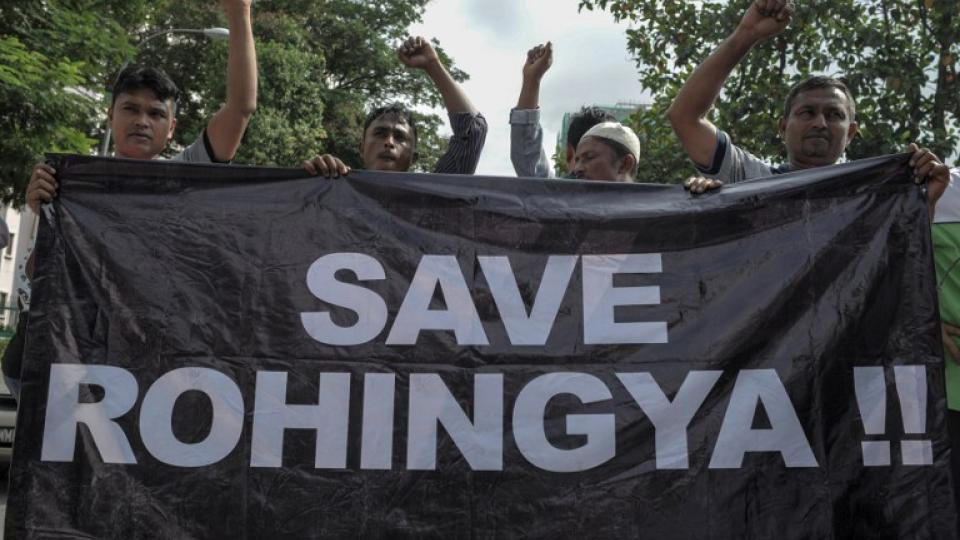Stop the killing of Rohingya: No cooperation with genocide!

In a September address to the United Nations Human Rights Council, top UN human rights official Zeid Ra’ad al-Hussein, described the Myanmar military’s attacks on Rohingya as being “a textbook example of ethnic cleansing”.
Satellite photos show the Myanmar security forces and local militia burning entire Rohingya villages to the ground. There are consistent accounts of extrajudicial killings, including the shooting of fleeing civilians.
Since the latest violence against the Rohingya began in August, more than 400,000 Rohingya people have fled to Bangladesh. There are reports of Myanmar authorities requiring Rohingya returning from Bangladesh to show “proof of citizenship”. Given that the Burmese government has stripped the Rohingya of all civil and political rights, including citizenship rights for decades, proof of citizenship is impossible to provide.
The latest genocidal attacks on the Rohingya should not come as a surprise to the international community.
In 2015, thousands of Rohingya fled violence in Myanmar by boat. They then became stranded in the Bay of Bengal because Thailand, Malaysia and Indonesia refused to let them land and pushed their boats back to sea. As a result, many hundreds of Rohingya starved to death at sea.
These governments were following the lead of the Australian government’s turn-back policy towards refugees on boats. The impasse was only broken when Acehnese villagers took pity on them and began rescuing the Rohingya themselves.
A November 2015 report by the International State Crime Initiative, Countdown to annihilation: Genocide in Myanmar, found that the Rohingya “face the final stages of genocide”. The report stated that decades of persecution have taken on a new and intensified form since mass killings in 2012, making the very existence of the Rohingya community very precarious.
The report analysed the persecution of the Rohingya against the six stages of genocide outlined by Professor Daniel Feierstein, director of the Centre of Genocide Studies at the University of Buenos Aires: stigmatisation and dehumanisation; harassment, violence and terror; Isolation and segregation; systematic weakening; mass annihilation; and symbolic enactment involving the removal of the victim group from the collective history.
The report concluded that the Rohingya have suffered the first four of the six stages of genocide. They have been stigmatised, dehumanised and discriminated against. They have been harassed, terrorised and slaughtered. They have been isolated and segregated into detention camps and securitised villages and ghettos. They have been systematically weakened through hunger, illness, denial of civil rights and loss of livelihood, placing the Rohingya at high risk of total annihilation.
However, the report did not cause the world to act to stop the genocide against the Rohingya people.
Australia played a despicable role at the UN Human Rights Council by insisting that the words “such violations and abuses” be replaced with the vague term “violence” in a resolution dealing with Myanmar’s refusal to allow UN investigators to visit Arakan state. Several member countries wanted a tougher resolution, given the scale of the attacks.
Australian foreign minister Julie Bishop refrained from condemning the Myanmar government and instead indicated her “concern” about the violence.
Britain has ended its military ties to Myanmar and says it will not resume them until the attacks on the Rohingya end.
But the Australian government has decided to continue its $300,000 military cooperation program with the Myanmar military. This is despite the Myanmar military leading and orchestrating the genocidal attacks on the Rohingya civilians and placing internationally banned landmines along its border with Bangladesh, in the path of Rohingya civilians fleeing the violence.
Australia’s decision to maintain military ties means it is aiding and abetting this genocide.
In the midst of the ethnic cleansing of Rohingya in Arakan state, Australian immigration officials are trying to bully seven Rohingya refugees on Manus Island to return to Myanmar. This would put their lives at risk, especially as the Australian government knows the Myanmar government does not recognise the Rohingya as citizens of Myanmar.
Australia should:
- Forcefully condemn the Myanmar government and military attacks on Rohingya and call on it to stop its violent attacks on and ethnic cleansing of the Rohingya from their homeland where they have lived for many generations.
- Call on Myanmar to grant full civil and political rights to Rohingya people, including citizenship rights.
- End all military ties with Myanmar until the human rights abuses against the Rohingya, other ethnic minorities and pro-democracy activists cease.
- Bring charges of human rights violations against senior Myanmar military officials and other regime figures involved in these atrocities.
- Stop trying to deport Rohingya refugees and asylum seekers and instead establish a program to bring any Rohingya who want to settle in Australia, and give them permanent residency and a clear pathway to citizenship, and
- Withdraw the Australian ambassador from Myanmar until the human rights abuses cease.
[Sue Bolton is a member of the Socialist Alliance national executive.]